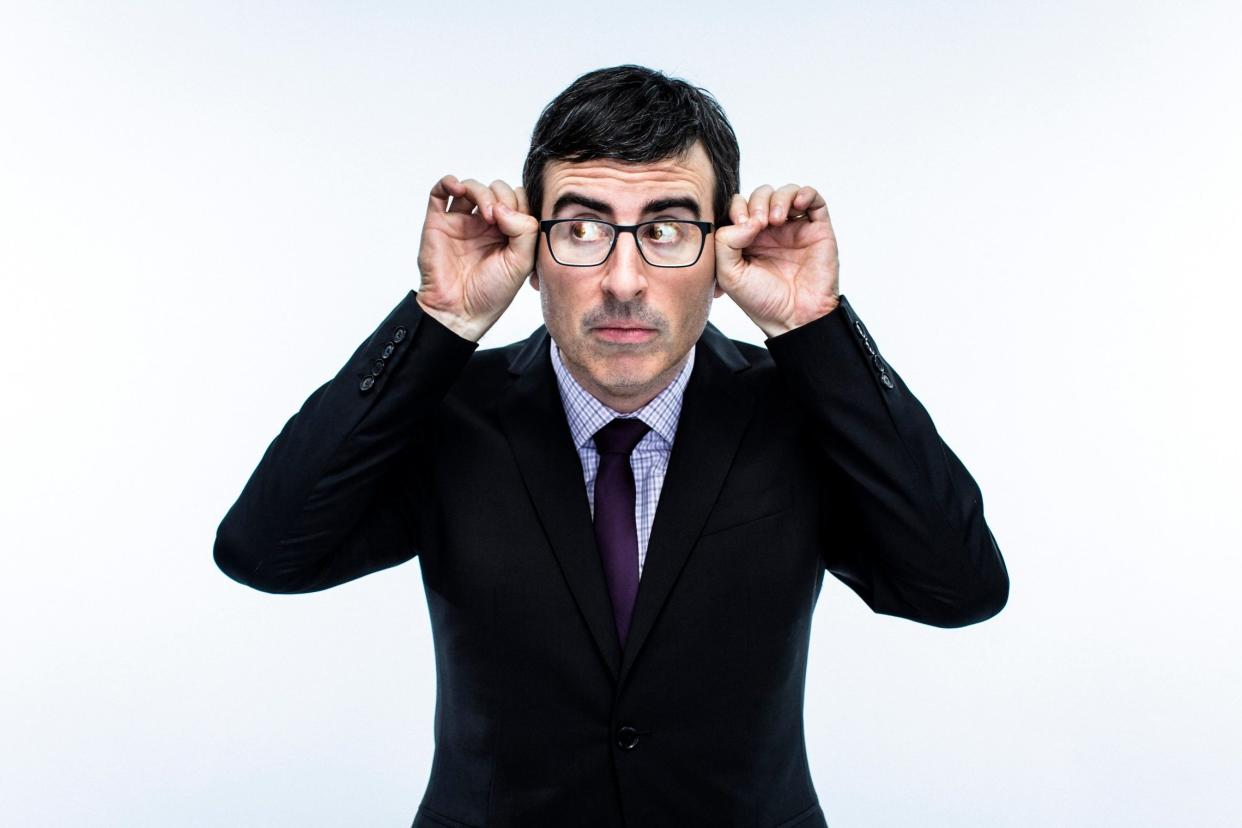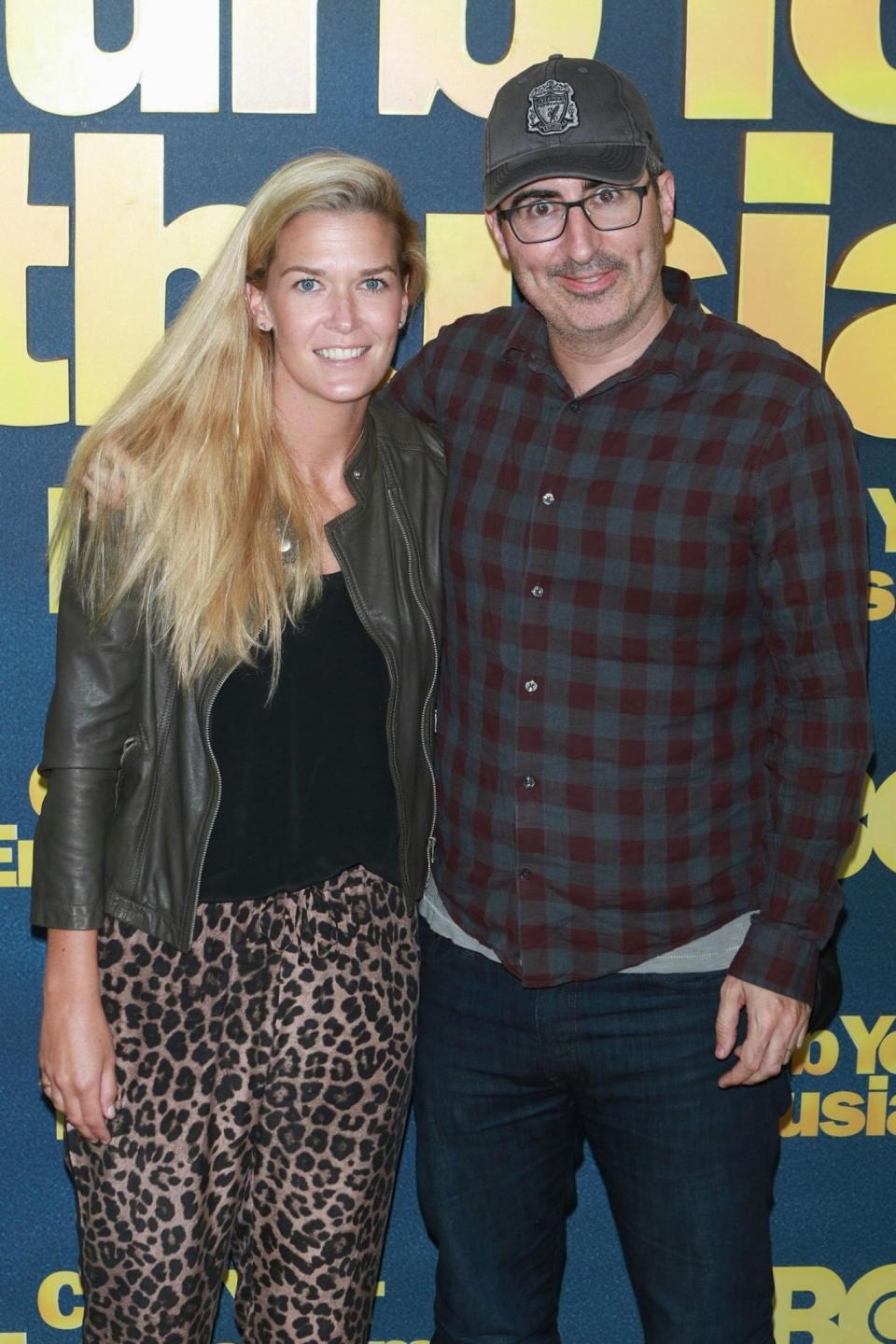John Oliver... the man making a mockery out of American politics

If you're looking for brainless levity from your late-night comedy to quash that existential dread and banish the anxiety dreams that have defined the past two years (it’s not only me, is it?), then John Oliver is definitely not your man. “I think everyone should be living in a state of manageable discomfort,” asserts the bespectacled US-based Briton. “You don’t want it to get to a point where it’s paralysing, but we don’t want people NOT to be anxious and scared. I’m pretty anxious all the time.”
Furthermore, he’d like you to take pause before you cheerfully copy and paste that story about sharks/paedophiles/Hillary Clinton. “The act of passing on a piece of bulls*** information makes you complicit in it,” he says firmly. “And I wish people were more embarrassed when they passed on something that turns out not to be true.”
Oliver is on a mission to do precisely the opposite: to bust wide open the bulls*** that others blithely promulgate and dig beneath the bluster to find some nuggets of truth — however unpalatable. Over the past five years the Birmingham-born, Cambridge-educated comedian has risen to the top of the savagely competitive late-night comedy pile with his satirical HBO show, Last Week Tonight (screened in the UK on Sky Atlantic) — a position imbued with more importance than ever in a world in which the US President calls the free press “the enemy of the people” .
We’re in a hotel room in Los Angeles where, a little earlier in the day, Oliver faced an audience of hundreds of just such “enemies of the people” — US television critics. Their uncharacteristically enthusiastic treatment of him in a panel session proves the high regard in which he is held. He has won six Emmy awards and two Peabodys so far, and is widely considered the Second Coming of a more comedic Jesus.

In person, the 41-year-old is more relaxed, polite and thoughtful than his ruthless, excoriating on-screen persona. Thrillingly, he even laughs — multiple times — at my jokes.
He acknowledges that the Trump presidency has altered his job in some ways, mainly thanks to the increasingly breakneck pace of the news agenda. “It’s like a firehose of nonsense that just gets pointed at you, and you have to sift through it to work out what is worth talking about and why,” he says. “This administration throws around so many verbal smoke-bombs that it’s important not to get distracted by them all.”
Oliver, instead, aims to expose everything else that is wrong with today’s America, from gerrymandering and confederate monuments to, this season, the National Rifle Association, TV, Bitcoin , the Iranian nuclear deal and “astroturfing” — corporations and political groups disguising themselves as fake grassroots movements.
"It’s hard to fall in love with a country behaving like this but I have skin in the game so I’m refusing to leave the US"
He also takes a global perspective — which is unusual for a US show. “Take the week the last Indian general election was happening. It was the largest exercise in democracy in human history and it was barely covered in the US,” he says, still apparently staggered. “It just made no sense to me. There was nothing more interesting to me that week.”
Last Week Tonight, whose spot-on-the-zeitgeist segments frequently go viral, consequently feels like something of a public service.
I point out, politely, that America has rewarded Oliver with a greater level of success than he ever achieved in the UK. “That is objectively true,” he chuckles. And, I venture, perhaps a greater degree of success than he’d have had if he’d stayed in the UK? “Definitely,” he agrees, enthusiastically.
“I struggled the whole time in England,” he says. “It was hard to get political comedy on the BBC when I was there, 12 years ago. There was often a sense that people wanted a version of The Daily Show with Jon Stewart. But to do that you need to have one single authoritative voice.
“You can’t make political comedy by committee,” he continues. “And that was the way things were done in Britain — everything was done by committee, or by a producer, rather than the host of the show — and that was frustrating for me.”
Born in the Birmingham suburb of Erdington, Oliver grew up in Bedford, where his parents were both teachers dealing with the sharp end of Margaret Thatcher’s education cuts. As a kid he loved doing plays but once he tried comedy “that overrode all things”.
He studied English at Cambridge University, where he was a member of Footlights alongside David Mitchell and Richard Ayoade, and after graduating appeared at the Edinburgh Fringe, then toured the UK stand-up circuit.

He won guest spots on Mock the Week and worked with Armando Iannucci on a radio show called The Gash, but only on reaching the US did he truly hit his stride. Ricky Gervais , who he knew a little, recommended him to Jon Stewart, host of the The Daily Show, who flew Oliver over for an interview. He’d never visited the US and had, he claims, “a fifth-grade understanding of American politics” but was, nonetheless, appointed as the show’s deadpanning “senior British correspondent”, a role he occupied for seven years.
Although he maintains the incredulity of an outsider — both off-screen and on — he’s now been a New Yorker for almost 12 years and has an American wife, Kate Norley, a doctor and Iraq War veteran, and two children. “Year upon year I have more skin in the game, to the point now that it’s pretty absolute,” he says of the US. “It’s hard to fall in love with a country that is behaving like this. But to the extent that I had control over it, I chose to fall in love with this place. I chose to move here, and I am refusing to leave.”
We digress, briefly, into a discussion of our respective immigration experiences. “At one point they were only giving me 12-month visas, so I was having to leave the country every year,” he recalls. “It was towards the end of the Bush administration and I could feel the aggression in the air — it was very clear that it wasn’t a done deal. When I finally got my green card I nearly cried. Which, of course, for a British person is actually crying a lot,” he qualifies, as if explaining to an invisible global audience.
“I realised then that I had been worried about it every day, that it was the background noise to everything that happened in my life. And the more I loved it here, the more destabilising that felt because I would just think: ‘What if I don’t get to stay?’”
Those he catches in his crosshairs may wish he didn’t — the impact of the show goes well beyond mere entertainment. What has become known as “the John Oliver effect” influences US policymaking and legislation as well as popular culture. A segment about the underfunding of public defenders resulted in thousands of dollars being donated by the show’s fans.
Oliver, however, has not lost his innate self-deprecation. “We try to be aware of the fact that if we ask people to do something they actually might do it,” he concedes. “But ‘the John Oliver effect’? I just do not think that is a real thing. At all.”
Last Week Tonight is on Sky Atlantic on Mondays at 10pm

 Yahoo News
Yahoo News 
